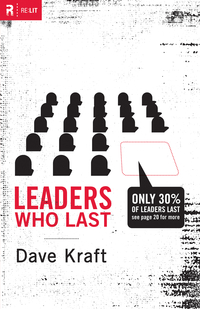Dave Kraft: Leaders Who Last
 Dave Kraft, Leaders Who Last (Wheaton, IL: Crossway, 2010), 155 pages, ISBN 9781433513183.
Dave Kraft, Leaders Who Last (Wheaton, IL: Crossway, 2010), 155 pages, ISBN 9781433513183.
Leaders Who Last is written for church leaders—pastors, teachers, small group leaders, volunteers, and ministry staff—by a church leader who posits that this book is about leaders finishing well. Kraft encourages now and future leaders in the church to lead in a “new way” that will help them “stay viable … survive [the] journey, and accomplish [their] objective” (p. 22). Relying on experience culled from forty plus years of ministry, Kraft argues that “the leader’s greatest calling and most significant long-term contribution is to recruit and train other leaders” (p. 144). He views Christian leadership as having four main responsibilities: shepherding, developing, equipping, and empowering. These responsibilities focus on building up followers and future leaders.
The book contains three sections plus an introduction and epilogue. The first section is called Foundations and has five chapters on power, purpose, passion, priorities, and pacing, which Kraft says are all foundational to lasting leadership. Leaders must be attentive to these areas to stay fruitful in ministry. In order to stay connected to their power source, leaders must practice spiritual disciplines, including reading Scripture, prayer, worship, and time for reflection. The remaining foundational aspects to leading flow from the power leaders receive from Jesus Christ. Kraft says, “Purpose is the foundation for everything” (p. 64). A purpose should give you energy, motivation, and direction. A biblically-based purpose will help leaders steer clear of distractions. Kraft provides helpful steps to identifying one’s purpose. Indeed, he offers steps for developing in all areas of leading, including passion, which he explains comes from God when we know who we are in him. In order to keep purpose and passion focused, Kraft urges leaders to determine clear priorities, and offers an intentional process for keeping one’s priorities in order. Finally, pacing is about being mindful of one’s capacity so that the leader does not burn out. Kraft recommends taking a day off once a week and limiting the number of evenings the leader is not at home.
The second section deals with Formation and covers the topics of calling, gifts, character, and growth. Whereas a leader’s purpose is based on her experiences and interests, a personal journey that starts from within, a calling comes from God. Kraft suggests that there are four types of spiritual call: to salvation, to discipleship, to service, and to leadership. His focus in this book is on the call to leadership. In order to last, leaders must have a clear and compelling call. He urges leaders to find people who will help them evaluate their calling. In turn, he encourages more experienced leaders to be on the lookout for younger, future leaders whom God is calling and to mentor them. In the chapter on the leader’s gifts, Kraft argues that the gifts of a leader tend more toward speaking than serving. Although he does not deny the importance of service, Kraft emphasizes that leaders who last have word gifts, that is the ability to use words to encourage, develop, equip, and inspire people to move from point A to point B. In addition, a leader’s character is vital to the longevity of her leadership. Kraft notes that the primary passages on leadership qualification in the Bible (1 Timothy 3 and Titus 1) refer mainly to character in the context of relationships. Kraft provides a list of essential character traits and a process for developing one’s character. He suggests that leaders discern which areas of their lives need growth and work with an accountability partner to develop those traits.
Category: Ministry, Summer 2014


